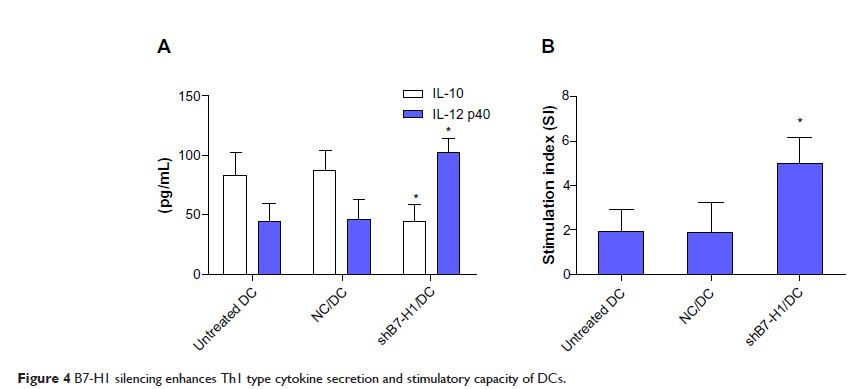108605
论文已发表
注册即可获取德孚的最新动态
IF 收录期刊
- 3.4 Breast Cancer (Dove Med Press)
- 3.2 Clin Epidemiol
- 2.6 Cancer Manag Res
- 2.9 Infect Drug Resist
- 3.7 Clin Interv Aging
- 5.1 Drug Des Dev Ther
- 3.1 Int J Chronic Obstr
- 6.6 Int J Nanomed
- 2.6 Int J Women's Health
- 2.9 Neuropsych Dis Treat
- 2.8 OncoTargets Ther
- 2.0 Patient Prefer Adher
- 2.2 Ther Clin Risk Manag
- 2.5 J Pain Res
- 3.0 Diabet Metab Synd Ob
- 3.2 Psychol Res Behav Ma
- 3.4 Nat Sci Sleep
- 1.8 Pharmgenomics Pers Med
- 2.0 Risk Manag Healthc Policy
- 4.1 J Inflamm Res
- 2.0 Int J Gen Med
- 3.4 J Hepatocell Carcinoma
- 3.0 J Asthma Allergy
- 2.2 Clin Cosmet Investig Dermatol
- 2.4 J Multidiscip Healthc

已发表论文
B7-H1 沉默增强预测加载抗原体外树突细胞疫苗的膀胱癌抗肿瘤作用
Authors Wang S, Wang YH, Liu J, Shao SX, Li XJ, Gao JN, Niu HT, Wang XS
Published Date August 2014 Volume 2014:7 Pages 1389—1396
DOI http://dx.doi.org/10.2147/OTT.S65367
Received 2 April 2014, Accepted 14 May 2014, Published 5 August 2014
Objective: The aim of this study was to examine whether short hairpin RNA (shRNA) expressing lentiviral particles targeting B7-H1 infection could result in B7-H1 knockdown on dendritic cells (DCs) and to investigate whether B7-H1 silencing could augment the immune function of DCs and further elicit a more potent anti-tumor immune effect against bladder cancer cells in vitro.
Methods: Monocyte-derived DCs, which were generated from peripheral blood mononuclear cells, were infected by a recombinant lentivirus containing shRNA sequence aimed at B7-H1. After that, the infected DCs were pulsed by tumor antigens and used to stimulate cytotoxic T lymphocytes-based anti-tumor effect in vitro.
Results: The lentivirus-mediated shRNA delivery method efficiently and effectively silenced B7-H1 in DCs. Furthermore, the B7-H1 silencing enhanced the stimulatory capacity and the secretion of interleukin-12, but down-regulated interleukin-10 secretion. And more importantly, the anti-tumor effect of bladder cancer antigen-loaded DC vaccine in vitro was also potentially augmented.
Conclusion: This study suggests that a combination of B7-H1 knockdown and target antigen delivery could augment anti-tumor effects in vitro, which potentially provides a novel strategy in the immunotherapy of bladder cancer.
Methods: Monocyte-derived DCs, which were generated from peripheral blood mononuclear cells, were infected by a recombinant lentivirus containing shRNA sequence aimed at B7-H1. After that, the infected DCs were pulsed by tumor antigens and used to stimulate cytotoxic T lymphocytes-based anti-tumor effect in vitro.
Results: The lentivirus-mediated shRNA delivery method efficiently and effectively silenced B7-H1 in DCs. Furthermore, the B7-H1 silencing enhanced the stimulatory capacity and the secretion of interleukin-12, but down-regulated interleukin-10 secretion. And more importantly, the anti-tumor effect of bladder cancer antigen-loaded DC vaccine in vitro was also potentially augmented.
Conclusion: This study suggests that a combination of B7-H1 knockdown and target antigen delivery could augment anti-tumor effects in vitro, which potentially provides a novel strategy in the immunotherapy of bladder cancer.
Keywords: B7-H1, bladder cancer, dendritic cell, vaccine, immunotherapy
